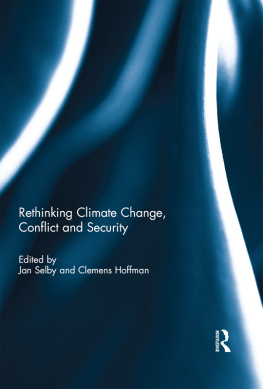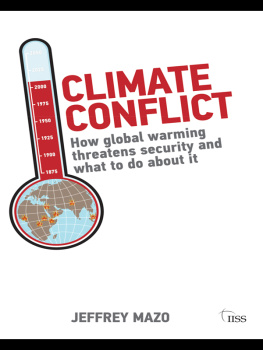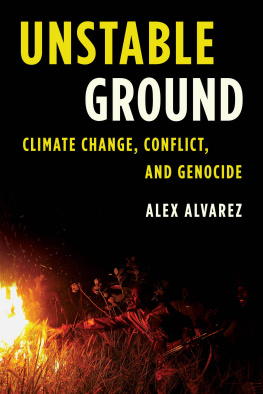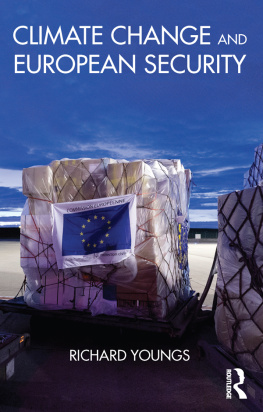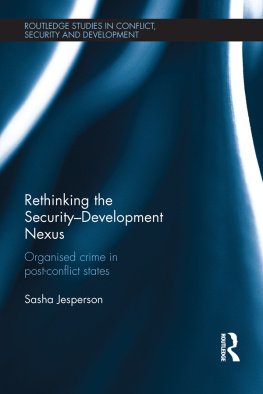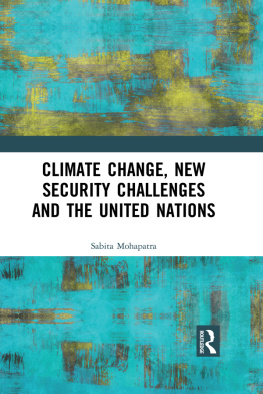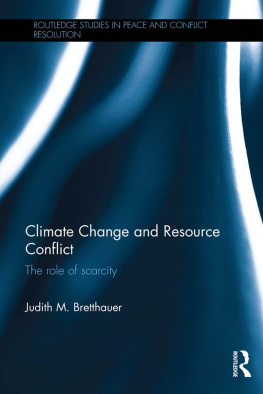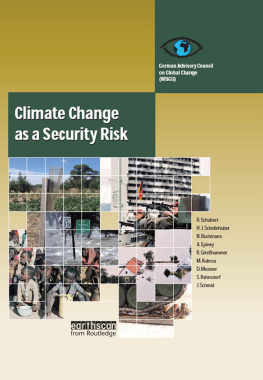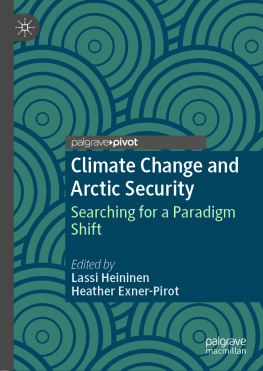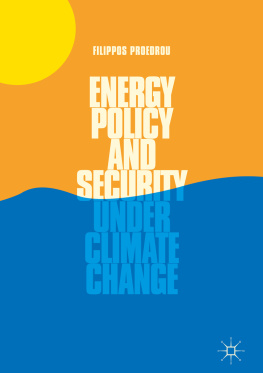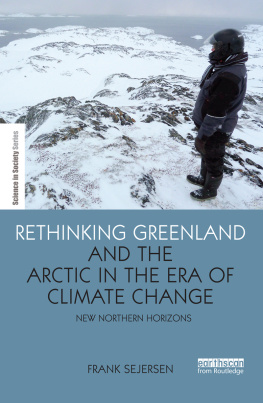Rethinking Climate Change, Conflict and Security
Is global climate change likely to become a significant source of violent conflict, and should it therefore be seen as a national security challenge? Most Northern governments, militaries, think tanks and NGOs believe so, as do many academic researchers, on the grounds that increased temperatures, changing precipitation patterns and rising sea levels will worsen existing social stresses, especially within poor societies and marginal communities across Africa and Asia.
This book argues otherwise. The first collection of its kind, it brings together leading scholars of Anthropology, Geography, Development Studies and International Relations to provide a series of critical analyses of mainstream thinking on the climate-security nexus. It shows how policy discourse on climate conflict consistently misrepresents the causes of violence, especially by obscuring its core political dimensions. It demonstrates that quantitative research provides a flawed basis for understanding climate-conflict linkages. It argues that climate security discourse is in hoc with a range of questionable military, authoritarian and developmental agendas. And it reveals that the greening of global capitalism is already having violent consequences across the global South. Climate change, the book argues, does indeed have serious conflict and security implications but these are quite different from how they are usually imagined.
This book was originally published as a special issue of Geopolitics.
Jan Selby is Professor of International Relations at the University of Sussex, UK, and Director of the Sussex Centre for Conflict and Security Research (SCSR). His research focuses on peace processes, environmental security, the Israeli-Palestinian conflict, and International Relations theory.
Clemens Hoffmann is Assistant Professor of International Relations at Bilkent University, Turkey. His research interests include political ecology, environmental conflict and security, critical, postcolonial and materialist IR theory, and Turkish foreign policy.
Rethinking Climate Change, Conflict and Security
Edited by
Jan Selby and Clemens Hoffmann
First published 2016
by Routledge
Park Square, Milton Park, Abingdon, Oxon, OX14 4RN, UK
and by Routledge
711 Third Avenue, New York, NY 10017, USA
Routledge is an imprint of the Taylor & Francis Group, an informa business
2016 Taylor & Francis
All rights reserved. No part of this book may be reprinted or reproduced or utilised in any form or by any electronic, mechanical, or other means, now known or hereafter invented, including photocopying and recording, or in any information storage or retrieval system, without permission in writing from the publishers.
Trademark notice: Product or corporate names may be trademarks or registered trademarks, and are used only for identification and explanation without intent to infringe.
British Library Cataloguing in Publication Data
A catalogue record for this book is available from the British Library
ISBN 13: 978-1-138-91539-8
Typeset in Garamond
by RefineCatch Limited, Bungay, Suffolk
Publishers Note
The publisher accepts responsibility for any inconsistencies that may have arisen during the conversion of this book from journal articles to book chapters, namely the possible inclusion of journal terminology.
Disclaimer
Every effort has been made to contact copyright holders for their permission to reprint material in this book. The publishers would be grateful to hear from any copyright holder who is not here acknowledged and will undertake to rectify any errors or omissions in future editions of this book.
Contents
Jan Selby and Clemens Hoffmann
Betsy Hartmann
Harry Verhoeven
Michael Mason
Jan Selby
Franziskus von Lucke, Zehra Wellmann, and Thomas Diez
Ayesha Siddiqi
Janani Vivekananda, Janpeter Schilling, and Dan Smith
Alexander Dunlap and James Fairhead
The chapters in this book were originally published in Geopolitics, volume 19, issue 4 (2014). When citing this material, please use the original page numbering for each article, as follows:
Introduction: Rethinking Climate Change, Conflict and Security Jan Selby and Clemens Hoffmann Geopolitics, volume 19, issue 4 (2014) pp. 747756
Converging on Disaster: Climate Security and the Malthusian Anticipatory Regime for Africa Betsy Hartmann Geopolitics, volume 19, issue 4 (2014) pp. 757783
Gardens of Eden or Hearts of Darkness? The Genealogy of Discourses on Environmental Insecurity and Climate Wars in Africa Harry Verhoeven Geopolitics, volume 19, issue 4 (2014) pp. 784805
Climate Insecurity in (Post)Conflict Areas: The Biopolitics of United Nations Vulnerability Assessments Michael Mason Geopolitics, volume 19, issue 4 (2014) pp. 806828
Positivist Climate Conflict Research: A Critique Jan Selby Geopolitics, volume 19, issue 4 (2014) pp. 829856
Whats at Stake in Securitising Climate Change? Towards a Differentiated Approach Franziskus von Lucke, Zehra Wellmann, and Thomas Diez Geopolitics, volume 19, issue 4 (2014) pp. 857884
Climatic Disasters and Radical Politics in Southern Pakistan: The Non-linear Connection Ayesha Siddiqi Geopolitics, volume 19, issue 4 (2014) pp. 885910
Understanding Resilience in Climate Change and Conflict Affected Regions of Nepal Janani Vivekananda, Janpeter Schilling, and Dan Smith Geopolitics, volume 19, issue 4 (2014) pp. 911936
The Militarisation and Marketisation of Nature: An Alternative Lens to Climate-Conflict
Alexander Dunlap and James Fairhead Geopolitics, volume 19, issue 4 (2014) pp. 937961
Please direct any queries you may have about the citations to
JAN SELBY
Department of International Relations, University of Sussex, Brighton, UK
CLEMENS HOFFMANN
Department of International Relations, Bilkent University, Ankara, Turkey
This special issue of Geopolitics presents a series of critical interventions on the links between global anthropogenic climate change, conflict and security. In this introduction, we situate the special issue by providing an assessment of the state of debate on climate security, and then by summarising the eight articles that follow. We observe, to start with, that contemporary climate security discourse is dominated by a problematic ensemble of policy-led framings and assumptions. And we submit that the contributions to this issue help rethink this dominant discourse in two distinct ways, offering both a series of powerful critiques, plus new interpretations of climate-conflict linkages which extend beyond Malthusian orthodoxy.
CLIMATE CHANGE AND SECURITY: THE STATE OF DEBATE
Held amidst the neo-classical splendour of Londons Lancaster House, the UK Foreign and Commonwealth Offices 2012 conference on climate and resource security brought together a couple of hundred diplomats, politicians, military officials, and corporate and NGO representatives to push forward the international debate on climate security. The conference was opened by Ed Davey, UK Secretary of State for Climate Change and Energy, who characterised global climate change as a threat multiplier that would magnify existing resource pressures, especially in fragile states already under threat, and concluded that we need to be ready for a world where climate instability drives political instability.1 Thereupon followed a series of gloom-ridden pronouncements from President Ali Bongo Ondimba of Gabons assertion that climate change in Africa will cause armed conflicts in 23 countries and political unrest in another 13 (by what exact date wasnt clear); to the claim that there are currently 350,000 climate-related deaths per year worldwide, rising to 1 million per year by 2030 if no action is taken.2 When one of the just two academics in attendance who happened to be one of the present authors had the temerity to comment from the floor that there was no scientific consensus on the conflict and security implications of climate change, the response was immediate and striking. One speaker dismissed this point as evidence of academic hubris. Another dismissed it on the grounds that consensus is lacking on all manner of issues (which is of course true but that hadnt stopped him or other participants from speaking as if there did exist a consensus on this particular subject). And still another asserted that the links between climate change and conflict were obvious, since 80% of conflicts happen in arid zones. Something close to a diplomatic norm had been violated.


